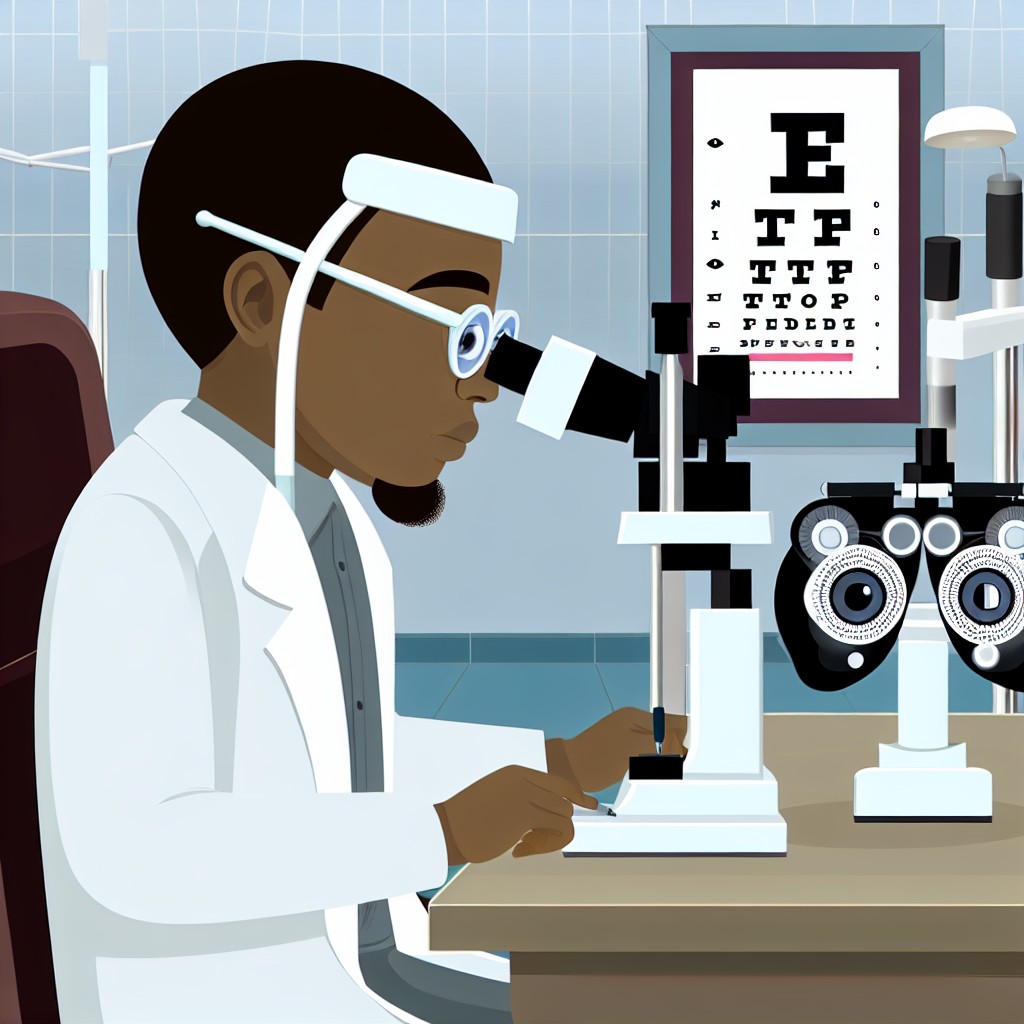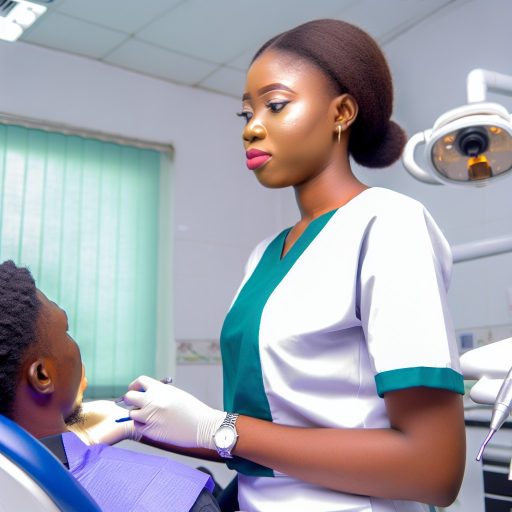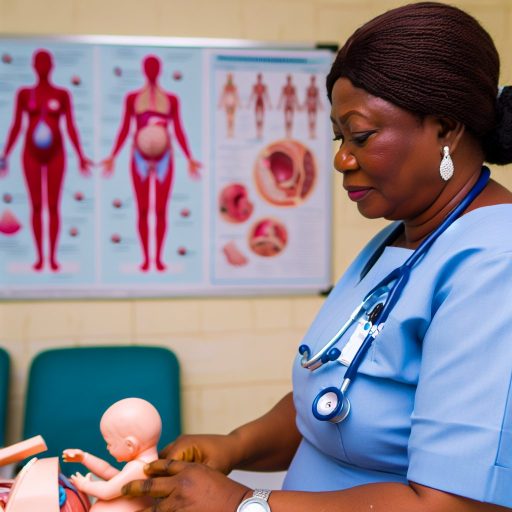Introduction:
Ophthalmology equipment is crucial for accurate diagnosis and treatment in healthcare settings.
Nigerian clinics are recognizing the importance of investing in specialized ophthalmology equipment.
Importance of Ophthalmology Equipment:
Discuss the role of ophthalmology equipment in diagnosing and treating eye conditions.
Highlight the impact of advanced equipment on patient outcomes and clinic efficiency.
Diagnosing and treating eye conditions
Ophthalmology equipment plays a crucial role in diagnosing various eye conditions.
This includes common refractive errors to serious diseases like glaucoma and cataracts.
The use of tools like ophthalmoscopes, slit lamps, and retinoscopes enables eye care professionals.
They can accurately assess the health of a patient’s eyes and provide appropriate treatment.
Impact on patient outcomes
The use of advanced ophthalmology equipment has significantly improved patient outcomes.
This improvement comes from facilitating early detection of eye diseases.
Advanced equipment enables more precise treatment interventions.
For example, digital retinal imaging systems allow for detailed examination of the retina.
This leads to timely detection of conditions like diabetic retinopathy.
Impact on clinic efficiency
Advanced ophthalmology equipment also enhances clinic efficiency.
This efficiency comes from streamlining diagnostic processes.
It reduces the time required for evaluating patients.
For instance, automated perimeters and tonometers enable quick measurements.
These measurements are essential for diagnosing glaucoma.
This efficiency translates into shorter wait times for patients.
It also increases throughput for the clinic.
In Nigeria, clinics typically use a range of ophthalmology equipment.
This variety caters to the diverse eye care needs of the population.
Some of the commonly used equipment include:
- Autorefractors: These automated devices are used to measure a patient’s refractive error quickly and accurately, essential for prescribing corrective lenses.
- Slit lamps: These instruments provide a magnified view of the eye’s structures, aiding in the diagnosis of conditions like cataracts, macular degeneration, and corneal abnormalities.
- Optical coherence tomography (OCT) scanners: These non-invasive imaging tools allow for detailed, cross-sectional imaging of the retina, helping in the diagnosis and monitoring of diseases like glaucoma and age-related macular degeneration.
- Phoropters: These devices contain multiple lenses that can be adjusted to determine the best prescription for a patient, crucial for accurate vision correction.
- Visual field analyzers: These instruments assess a patient’s peripheral vision, vital for diagnosing conditions like glaucoma and neuro-ophthalmic disorders.
By investing in modern ophthalmology equipment, Nigerian clinics can ensure they are equipped.
This investment meets the increasing demand for quality eye care services.
The use of advanced tools enhances diagnostic accuracy and treatment outcomes.
It also improves the overall efficiency of the clinic’s operations.
With the right equipment at their disposal, eye care professionals can deliver comprehensive care.
This ultimately contributes to the preservation of vision and eye health in the Nigerian population.
Commonly Used Equipment in Nigerian Clinics:
When it comes to providing top-notch eye care services in Nigerian clinics, several essential tools are commonly used to diagnose and treat various eye conditions.
Let’s explore some of the key equipment used in ophthalmology practices across Nigeria:
Ophthalmoscopes:
Ophthalmoscopes are fundamental tools used by ophthalmologists to examine the inside of the eye, including the retina, optic nerve, and blood vessels.
This device allows the eye care provider to detect eye diseases such as diabetic retinopathy, glaucoma, and macular degeneration.
By using an ophthalmoscope, ophthalmologists can assess the health of the eye and monitor changes over time.
This piece of equipment is essential for performing comprehensive eye exams and making accurate diagnoses.
In Nigerian clinics, ophthalmoscopes play a crucial role in helping ophthalmologists provide high-quality eye care services to their patients.
Slit Lamps:
Slit lamps are another essential piece of equipment used in Nigerian clinics for examining the external and internal structures of the eye.
This device provides a magnified view of the eye, allowing ophthalmologists to assess the health of the cornea, lens, and iris.
Slit lamps are commonly used to diagnose conditions such as cataracts, corneal ulcers, and conjunctivitis.
By using a slit lamp, ophthalmologists can detect abnormalities in the eye and determine the most appropriate treatment options for their patients.
Transform Your Career with Expert Guidance
Get personalized mentorship consulting that’s tailored to your unique path. Our expert advice is actionable and exclusive.
Get StartedIn Nigerian clinics, slit lamps are indispensable tools for conducting detailed eye examinations and ensuring accurate diagnoses.
Tonometers:
Tonometers are vital tools used to measure intraocular pressure, which is crucial for detecting and monitoring glaucoma.
By measuring the pressure inside the eye, ophthalmologists can assess the risk of optic nerve damage and vision loss associated with glaucoma.
Tonometers are used to screen patients for elevated intraocular pressure and monitor changes in pressure over time.
This piece of equipment plays a significant role in the early detection and management of glaucoma, a leading cause of blindness in Nigeria.
In Nigerian clinics, tonometers are essential for preventing vision loss and preserving the eye health of patients.
Importance of Ophthalmology Equipment:
Ophthalmology equipment such as ophthalmoscopes, slit lamps, and tonometers are vital tools used in Nigerian clinics to provide high-quality eye care services.
These essential pieces of equipment enable ophthalmologists to conduct comprehensive eye examinations, make accurate diagnoses, and monitor eye health effectively.
By utilizing advanced equipment in their practices, ophthalmologists in Nigeria can provide optimal care to their patients and help prevent vision loss due to various eye conditions.
Learn More: Prominent Nigerian Parasitology Researchers
Challenges Faced in Acquiring Equipment:
In Nigeria, clinics face various challenges when it comes to acquiring ophthalmology equipment.
One of the major obstacles is the financial constraints that many clinics encounter.
Due to budgetary limitations, clinics often struggle to purchase the necessary equipment to provide quality eye care services.
The high cost of specialized ophthalmology equipment is another significant challenge that clinics in Nigeria face.
The limited availability of such equipment in the country contributes to the high costs, making it difficult for clinics to invest in the latest technologies.
This equipment is needed for effective diagnosis and treatment.
Moreover, the lack of access to affordable financing options exacerbates the challenges faced by clinics in acquiring ophthalmology equipment.
Many clinics simply do not have the financial resources to purchase expensive equipment outright.
This leads to delays in upgrading their facilities and providing the best possible care for their patients.
In addition, the competitive nature of the healthcare industry in Nigeria means that clinics must constantly strive to stay current with the latest advancements in ophthalmology equipment.
This pressure to remain updated with technology further compounds the financial burden on clinics.
They are forced to invest in new equipment to remain competitive in the market.
The challenges faced by Nigerian clinics in acquiring ophthalmology equipment underscore the need for sustainable solutions.
These solutions should address the financial constraints and limited availability of specialized equipment in the country.
By exploring alternative financing options, promoting partnerships with manufacturers, and advocating for increased government support, clinics can overcome these challenges.
They can enhance the quality of eye care services available to the Nigerian population.
- Address the financial constraints that Nigerian clinics often encounter.
- Discuss the limited availability and high cost of specialized ophthalmology equipment in the country.
See Related Content: Key Skills for Nigerian Anaesthesiologists
When it comes to equipping ophthalmology clinics in Nigeria, there are often challenges that need to be overcome.
Here are some strategies for addressing these equipment challenges:
Seeking Donations or Partnerships
- Consider reaching out to medical device companies for potential donations.
- Establish partnerships with these companies to receive discounted equipment or special offers.
- Collaborate with charitable organizations or foundations that support healthcare initiatives in Nigeria.
Improving Training and Maintenance Support
- Provide comprehensive training programs for clinic staff on how to use and maintain equipment.
- Work with equipment manufacturers to offer training sessions specifically tailored to Nigerian clinics.
- Ensure ongoing support for maintenance by establishing a relationship with technical experts or service providers.
By implementing these strategies, clinics in Nigeria can better overcome equipment challenges and improve the quality of care they provide to patients.
See Related Content: Regulation and Licensing of Physiotherapists in Nigeria

Case Studies of Clinics with Advanced Equipment:
There are several healthcare facilities in Nigeria that have made significant investments in modern ophthalmology technology.
These clinics have not only improved their overall service delivery but have also experienced positive outcomes and benefits for both the clinics and their patients.
Eye Foundation Hospital:
- They have state-of-the-art equipment for the diagnosis and treatment of various eye conditions.
- Patients at Eye Foundation Hospital have access to advanced diagnostic tools such as OCT and fundus photography.
- The use of these technologies has helped in accurate diagnosis and timely treatment of eye diseases.
- Patients have reported higher satisfaction rates due to the quick and effective treatment they receive at the clinic.
Lagos University Teaching Hospital (LUTH):
- LUTH has recently upgraded its ophthalmology department with modern equipment.
- They now have advanced surgical tools for procedures like cataract surgery and retinal detachment repair.
- The use of these advanced tools has led to better surgical outcomes and reduced complication rates.
- Patients at LUTH have access to cutting-edge treatments that were previously unavailable in Nigeria.
St. Nicholas Hospital:
- This hospital has invested in the latest laser technology for refractive surgeries like LASIK.
- Patients who undergo LASIK surgery at St. Nicholas Hospital experience improved vision and reduced reliance on glasses or contact lenses.
- The success rate of LASIK surgeries at St. Nicholas Hospital is high, with minimal side effects reported by patients.
- This investment in laser technology has made St. Nicholas Hospital a preferred choice for patients seeking refractive surgeries in Nigeria.
Clinics in Nigeria that have invested in advanced ophthalmology equipment have witnessed positive outcomes such as improved patient satisfaction, better treatment outcomes, and access to cutting-edge technologies.
These investments not only benefit the clinics by improving their service delivery but also have a significant impact on the overall eye health of the population in Nigeria.
Explore Further: Path to Becoming an Optometrist in Nigeria
Future Trends in Ophthalmology Equipment:
As technology continues to advance across various industries, the field of ophthalmology is not exempt from these innovations.
In Nigeria, clinics and hospitals are beginning to adopt new technologies to enhance their eye care services.
Let’s explore the predicted direction of technological advancements in ophthalmology equipment and how innovations like telemedicine and mobile devices may impact practices in Nigeria.
Predictions for Technological Advancements in Eye Care Equipment:
- Increased emphasis on digital imaging technology for diagnosing eye conditions.
- Integration of artificial intelligence for more accurate and efficient diagnoses.
- Development of advanced surgical robots for precise and minimally invasive procedures.
- Enhanced telemedicine tools to facilitate remote consultations and follow-ups.
- Utilization of virtual reality for patient education and pre-operative planning.
Impact of Telemedicine and Mobile Devices on Ophthalmology Practices:
- Improved access to eye care services in remote or underserved areas of Nigeria.
- Convenience for patients to consult with ophthalmologists from the comfort of their homes.
- Efficient use of resources by reducing the need for in-person visits for routine eye exams.
- Integration of mobile apps for tracking eye health and medication adherence.
- Potential for early detection of eye conditions through mobile screening tools.
The future of ophthalmology equipment in Nigeria looks promising with the integration of advanced technologies like AI, telemedicine, and mobile devices.
These innovations have the potential to revolutionize eye care practices by improving efficiency, accessibility, and patient outcomes.
Importance of Ophthalmology Equipment in Nigeria
Ophthalmology equipment plays a crucial role in Nigerian clinics.
This equipment aids in the diagnosis and treatment of eye conditions.
Clinics must invest in high-quality equipment.
Such investments provide the best possible care for patients.
Support is needed to enhance eye care services in Nigeria.
This ensures individuals receive the necessary treatment.
By prioritizing advanced ophthalmology equipment, clinics can improve patient outcomes.
They also contribute positively to the overall healthcare system in the country.
Additional Resources
Direct non-medical and indirect costs of glaucoma care in a Nigerian …
Policies for primary eye health care in Nigeria: a case study – PMC




